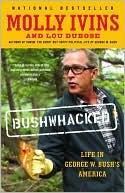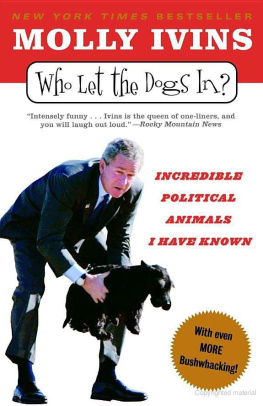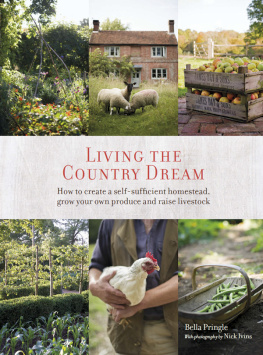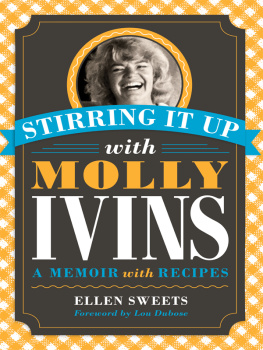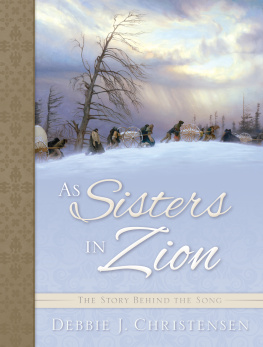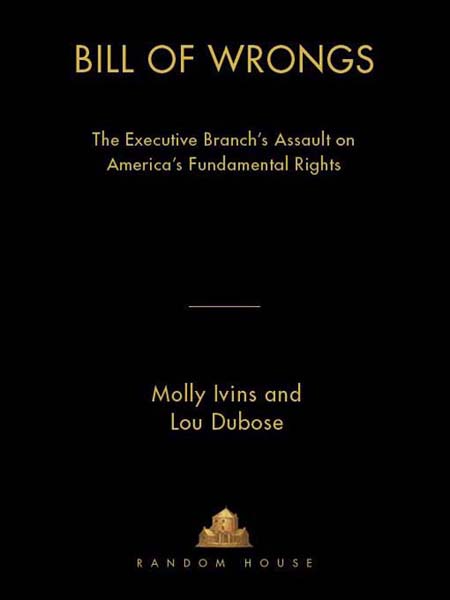
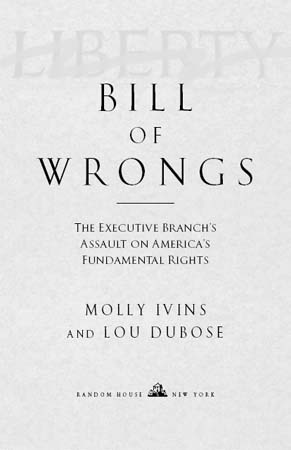
CONTENTS
INTRODUCTION
A REPUBLICIF WE CAN KEEP IT
ONE
INDEPENDENCE DAY
TWO
A ZONE OF THEIR OWN
THREE
THE KIDS ARE ALRIGHT
FOUR
DARWIN ON TRIAL
FIVE
SNEAKING AND PEEKING
SIX
ROE V. DOE
SEVEN
OUR TIME IN THE SHADOWS
EIGHT
TERRORIST SURVEILLANCE PROGRAM OR WARRANTLESS WIRETAPS?
To Audre and Bernard Rapoport, of Waco, Texas, who are a public good and generous supporters of The Texas Observer, where both authors began their careers
INTRODUCTION

A REPUBLICIF WE CAN KEEP IT
To those who scare peace-loving people with phantoms of lost liberty, my message is this: Your tactics only aid terrorists; for they erode our national unity and diminish our resolve. They give ammunition to Americas enemies, and pause to Americas friends.
Attorney General JOHN ASHCROFT, December 5, 2001
I set out to write this book as a cheerful and joyous tribute to all the heroes I have met over all the years, the folks who make the Bill of Rights more than just dead words on an old parchment. They make those rights into living, breathing freedom. I wanted to write this book because I believe every generation of Americans has to work to keep it, as Mr. Franklin said of our republic.
I wanted to tell the stories of the contemporary heroesplain, average, normal, everyday Americanswho stand up for freedom, even when it pisses off their neighbors and costs them a lot, one way or another.
This book grows out of a long-standing commitment of mine. For more than fifteen years, I have made at least one free speech a month on behalf of the Bill of Rights. I started doing the speeches because of a promise I made to a dying friend: Hows that for touching?
Actually, it was ridiculous: I promised John Henry Faulk I would take care of the First Amendment, a fairly ludicrous case of overreach. John Henry Faulk was a Texas folklorist, humorist, and the man who broke the blacklisting system in radio and television. When Johnny got blacklisted in 1956for being a premature anti-Fascist (he never did like Hitler)he did not go gently into that dark night. Instead, he promptly sued the sons of bitches. Its a fine storyEdward R. Murrow took out a mortgage on his house to pay John Henrys lawyer, Louis Nizer, one of the great trial attorneys of the day. The blacklisters were represented by one Roy Cohn. Murray Kemptons hilarious account of the proceedings is worth looking up. Of course it all took years to come to trial, by which time Johnny was not only out of showbiz but totally broke. For the remaining years of his life, he made a slim living as an after-dinner speaker, telling his stories of great Texas characters, but far more important, he functioned as a friend of the First Amendmentanywhere, everywhere, all the timefunny, irreverent, and in love with Jefferson and Madison.
The only time I have ever broken what I consider my commitment to John Henryone free speech a month someplace where its neededwas while writing this book. Through two rounds with breast cancer, and some subsequent heart problems, not to mention many a massive hangover, I have staggered onto a plane and arrived at Lard Lake or Fluterville, where some desperate citizens needed help. Ive made a locally adapted variation of my basic speech, which includes some great stories and, if I do say so myself, is actually fairly funny.
I began doing this under the illusion that I was being noble and self-sacrificingnot that I would toot my own horn, but I kind of hoped others might notice what a commendable citizen I am. As so often happens when we give to others, the speech a month became not a sacrifice but a continuing source of inspiration, courage, and energy. The commitment hasnt so much cost me time and effort as it has repaid me tenfold by letting me get to know the real heroes of freedom in this country: I have received so much more than I have ever given to this cause; I have been enriched beyond my ability to describe.
My deal with all the First Amendment groups is that I do not give my speech in New York City or San Francisco. I usually do not go anywhere there are a lot of liberals. Consequently, I have spent a lot of time in small cities and towns in Mississippi, northern Georgia, Alabama, northern Louisiana, north Florida, odd parts of the Carolinas, the Dakotas, western Michigan, Utah, Nebraska, Idaho, Montana, Kansas, and Oklahoma. I say unto you, you do not know what courage is until you have sat in the basement of a Holiday Inn in Fritters, Alabama, with seven brave souls, led by a librarian, who are fixing to form a chapter of the Ay Cee Ell You. They are always driven to this extreme by local pinheads who not only dont get the Bill of Rights but are eager to trash it.
I have been called in through the American Library Association on some bizarre cases: say, the local Christian fundamentalists have decided talking animals are satanic, and consequently, they demand The Three Little Pigs, Goldilocks and the Three Bears, and The Wind in the Willows be removed from the town library. Town meeting to be held, can I come and explain the First Amendment?
I try to explain what the First Amendment means with good stories, because thats what John Henry taught me to do. For that matter, Mark Twain and Jesus were both fond of the form, not that Im putting myself anywhere near there. Youd be amazed at how much even the most sophisticated people still enjoy a good story. And you will find a lot of good stories in this book.
Reporting and telling these stories with me is my colleague Lou Dubose. We have done two books together: Shrub: The Short but Happy Political Life of George W. Bush (describing George Bushs failed oil career and disastrous six years as governor of our state) and Bushwhacked: Life in George W. Bushs America (for anyone who didnt heed our warning the first time). Lou has also written books on Karl Rove, Tom DeLay, and Dick Cheney. Some people know how to amuse themselves.
I started with the First Amendment for obvious reasonsif youre a journalist, freedom of speech and freedom of the press are matters of both personal and professional self-interest. Over the years, I have of necessity spent more and more time on the very first sixteen words of the First Amendment, which establish the most important right of all: freedom of conscience. Also known as the Establishment Clause. This includes the newly controversial concept of separation of church and state. In addition, I have found myself involved in several controversies involving the other nine of the original ten amendments that form the Bill of Rights.
I meant for this to be a hopeful and a gladsome romp through some serious terrain, and I do think the book includes some right joyous tales. To all the daring, courageous, or just plain stubborn ordinary Americans who have ever gotten up on their hind legs and said, Well, thats not right, thats not fair: this book is still dedicated to you.
But since September 11, 2001, the story of those who stand up for American freedom has gotten darker. The extraordinary heroes are still out there, but now we find more victims of our failure to stand up for our own rights. Their stories start like Kafkas The Trial.
Next page

